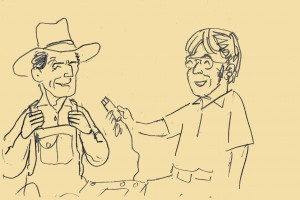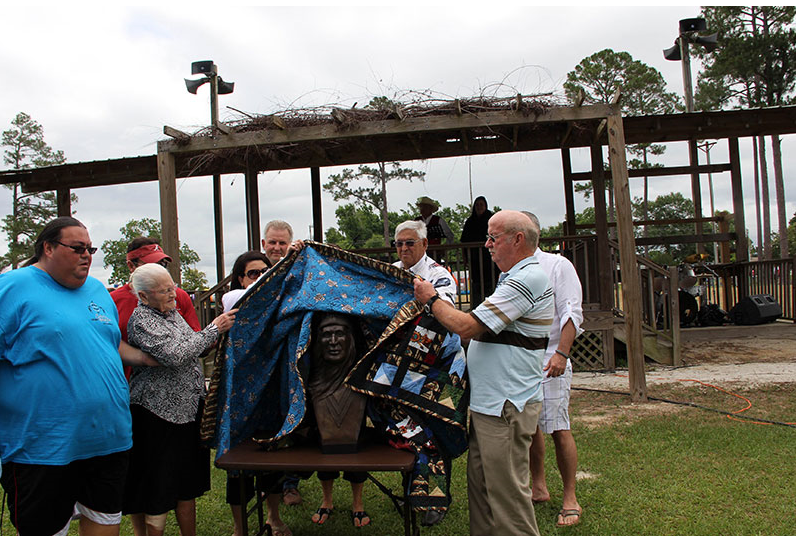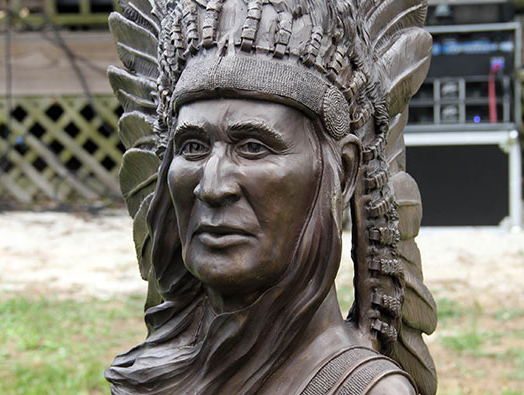Gainesville, FL—The Poarch Creek Project at the Samuel Project Oral History Program at the University of Florida, which focused on the digitization of oral histories conducted with the Poarch Creek Nation of Alabama in the 1970s, concluded in Summer 2013 with the successful transcribing of over 60 interviews. The oral histories were transferred to the Poarch Creek Nation, in partnership with the tribe, and are currently used in displays and exhibits at the Calvin McGhee Cultural Authority’s newly opened history museum, as well as the Evening with the Elders heritage program, a monthly series of oral history feature events.
Original Oral Histories: 1970s

Completion of the Poarch Creek Project is a testament to decades of cultural preservation work conducted between the Poarch Nation with the University of Florida, Samuel Proctor Oral History Program, and anthropologist Dr. James Anthony “Tony” Paredes, who passed away in August 2013.
The interviews, originally conducted by and processed in the 1970s by Paredes for the Samuel Proctor Oral History Program, were digitized and re-transcribed in partnership with the Poarch Creek Nation and SPOHP from 2012-2013 to enhance the collection’s accessibility as historical resources.
The oral history interviews in the Poarch Creek Project focus on tribal history and customs with Poarch elders, including songs, education, language, traditional medicine, church practices and political organizing, as well as reflections on future tribal goals. The Poarch Band descendants represent some of the only Muscogee Creeks to remain in Alabama through the Indian Removal period of the 1830s, and were federally recognized as a tribe in 1983 after years of research and documentation spearheaded by Chief Calvin McGhee. The Poarch Band is the only tribe in the state to receive such a designation. Oral histories with Poarch leader Jack Daughtry and the McGhee, Tulis, and Rollin families, among others, are included in the collection.
Ongoing Research and Education
“These oral histories are a unique educational resource, both for Poarch Creek history and the span of oral history practice within our program,” said Diana Dombrowski, senior research associate at SPOHP and coordinator of the Poarch Creek Project. “The interviews are frequently used in educational programs, exhibits and displays at the Poarch Creek Nation, and are a clear example of oral history’s importance in cultural preservation work, especially at a community-based level.”
Scott Kraff, a SPOHP and UF alum, worked as a transcriber and audit editor with the oral histories. “I really enjoyed the stories people told about Chief Calvin McGhee, who led the drive to get the money the federal government owed to the Poarch Creek people,” he said. “I transcribed the 3-part interview with his wife, Joyce McGhee, who recounted Calvin’s life and everything he did for his people. The interviews with his brothers gave a deeper insight into what type of man he really was, and his efforts were talked about through all the interviews. They were a very significant part of the Creek history.”
Kraff is currently studying law at Georgetown University and credits his work on the Poarch Creek Project with contextualizing the historical controversies behind projects he is currently undertaking as a law student, which include civil procedure cases on behalf of Native American tribes.
The transcribing and digitizing process was a unique educational experience for staff working with the interviews, which were originally processed by SPOHP forty years ago and involved the retelling of tribal histories over a span of hundreds of years. Isht Vatsa, SPOHP staff and UF alum, worked as a transcriber and audit editor.
“An interesting aspect of working on the Creek project was the ability to track and analyze the development of the Creek Nation in the east for over a century, beginning with the original treatises that allowed for the formal establishment of the community, through infrastructural development, educational advances, and social changes,” he said. “The Creek Project allowed me to view a true photo album of the East Creek Nation’s history, not simply a snapshot.”
In Memoriam: Dr. Tony Paredes
The Poarch nation is planning a memoriam for Paredes at its next Evening with the Elders event on November 4. Paredes worked as an anthropology professor at Florida State University for more than thirty years and remained involved with the Poarch Creek Nation throughout his life, playing an integral part in their documentation as a tribe and case for recognition by the federal government in 1984. He published “The Creek Nation East of the Mississippi” about the Poarch Band, as well as “Indians of the Southeast in the Late 20th Century,” “Paradoxes of Modernism and Indianness in the Southeast,” and many other works, listed in his official bibliography. Paredes’ Poarch Bibliography. Paredes’s obituary was recently published in the Orlando Sentinel.
For more information about the Poarch Creek oral history interviews, digitization initiatives, and cultural heritage education and preservation efforts in the Poarch Nation, contact Diana Dombrowski, senior research associate at the Samuel Proctor Oral History Program (ddombrowski@ufl.edu) or Deidre Dees, Tribal Archivist for the Poarch Band of Creek Indians in Atmore, Alabama (ddees@pci-nsn.gov).

